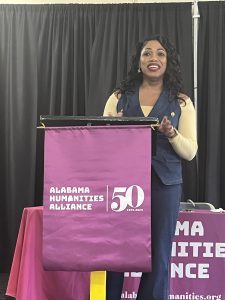October 1, 2025 — A children’s literature project for students with learning disabilities. A living history wax museum and City Hall field trip. A storytelling series. And a class-created book of civic rights and responsibilities.
These are the winning project ideas submitted by Alabama educators chosen as AHA’s 2025 Riley Scholars. This year’s winners are Abby Crews (Geneva), Jordan Franck (Florence), Amanda Ridge (Russellville), and Ashlie-Nicole Wehner (Huntsville).
The competitive Jenice Riley Memorial Scholarship is awarded annually to K-8 educators who excel at helping students engage with history and civics. Riley Scholars receive $2,000 in support of history- and civics-related classroom projects or for professional development opportunities.
Funded through the W. Edgar Welden Fund for Education, this scholarship is a tribute to the late Jenice Riley — a passionate educator and daughter of former Alabama governor and first lady Bob and Patsy Riley. Edgar Welden is a former AHA board member and a steadfast supporter of educational initiatives in Alabama. Since 2003, the Alabama Humanities Alliance has named 110 Riley Scholars and funded more than $114,000 in teacher scholarships.
If you’d like to help AHA continue supporting Alabama’s teachers and students, consider making a gift to support the Alabama Humanities Alliance.
Applications open for 2026!
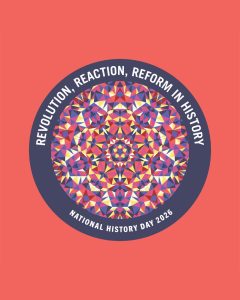 Applications are now being accepted for AHA’s 2026 Jenice Riley Memorial Scholarships. Alabama educators are encouraged to apply by April 30, 2026.
Applications are now being accepted for AHA’s 2026 Jenice Riley Memorial Scholarships. Alabama educators are encouraged to apply by April 30, 2026.
The 2026 proposal theme is “Revolution, Reaction, Reform in History.” All Riley Scholarship proposals should address how funds would be used to enhance teaching and learning about historical events and movements connected to different revolutions, reactions, and reforms in our history.
This year’s theme is inspired by (but not limited to) the 250th anniversary of America’s Declaration of Independence in 2026. This is also the theme of AHA’s 2026 Alabama History Day competition.
Meet our 2025 Riley Scholars
Abby Crews, Mulkey Elementary (Geneva County)
Geneva City Schools | Fifth Grade
PROJECT: City Hall Field Trip and Living History Wax Museum
This multi-pronged project will take students on a field trip to Geneva’s new City Hall, which will include a city council simulation. Back at school, Crews will help students create a voting booth for school elections. Finally, students will participate in a Living History Wax Museum that gives them a chance to study history while enhancing their writing, reading, public speaking, and critical thinking skills.
Jordan Franck, Forest Hills Elementary (Lauderdale County)
Florence City Schools | Fifth Grade
PROJECT: Rights and Responsibilities Storytelling Series
One of the most common ways that students learn about the history of our country is through the art of storytelling. The goal of Franck’s project is to help students learn about history and civics through a new and robust library of history books. Novel studies will also be incorporated into the reading curriculum to help students personally connect with history and civics, to inspire them as future leaders.
Amanda Ridge, Russellville Middle (Franklin County)
Russellville City Schools | Sixth Grade
PROJECT: How Can I be a Golden Patriot?
Around 60 percent of students in Ridge’s classroom come from families that immigrated to the United States. This has inspired a hands-on idea for learning about U.S. history and civics. Students will begin by studying the book, For Which We Stand, a book that explains the origins of U.S. government, how it works, and how to engage with it. Students will then create their own book of civic rights and responsibilities, making copies to keep and copies to donate to local libraries.
Ashlie-Nicole Wehner, Jones Valley Elementary (Madison County)
Huntsville City Schools | Special Education, Grades 4-6
PROJECT: Three Bears Den
Can children’s literature help foster an understanding of rights and responsibilities among students with special needs? Wehner will lead a civics classroom project centered around Goldilocks and the Three Bears, leading discussions on the “Goldilocks Theory” of what is “just right” – our daily decisions to make the right choices and be responsible for our own actions. Scholarship support will enable Wehner to create a “Three Bears Den,” with resources and equipment to make learning more accessible for her students with a variety of learning disabilities.
About the Alabama Humanities Alliance
Founded in 1974, the nonprofit and nonpartisan Alabama Humanities Alliance has served as a state affiliate of the National Endowment for the Humanities. Through our grantmaking and public programming, we promote lifelong learning, impactful storytelling, and civic engagement. We believe the humanities can bring Alabamians together and help us better understand the communities we call home.

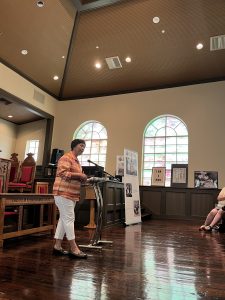 Last Wednesday, educator Cynthia Jackson sat in a pew at Birmingham’s historic Bethel Baptist Church, speaking quietly with Rev. Carolyn McKinstry, D.Div., a beloved author and minister who, as a teenager, had survived the 16th Street Baptist Church bombing.
Last Wednesday, educator Cynthia Jackson sat in a pew at Birmingham’s historic Bethel Baptist Church, speaking quietly with Rev. Carolyn McKinstry, D.Div., a beloved author and minister who, as a teenager, had survived the 16th Street Baptist Church bombing.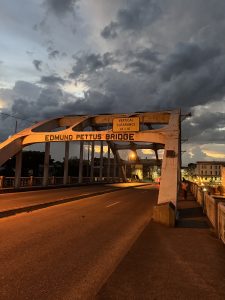 Along the way, teachers visited archives to identify primary resources they could use in the classroom. On the final day of the residency, teachers even crafted potential new lesson plans and then presented them to each other for peer feedback.
Along the way, teachers visited archives to identify primary resources they could use in the classroom. On the final day of the residency, teachers even crafted potential new lesson plans and then presented them to each other for peer feedback.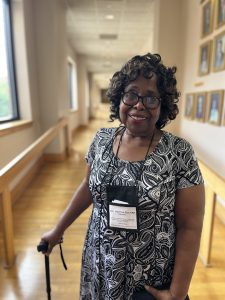 Stony’s project director is Martha Bouyer, D.Min., an educator and civil rights scholar who was named an AHA Alabama Humanities Fellow in 2018. Dr. Bouyer has led various versions of Stony for AHA through the years, drawing on her experience as executive director of the Historic Bethel Baptist Church Community Restoration Fund.
Stony’s project director is Martha Bouyer, D.Min., an educator and civil rights scholar who was named an AHA Alabama Humanities Fellow in 2018. Dr. Bouyer has led various versions of Stony for AHA through the years, drawing on her experience as executive director of the Historic Bethel Baptist Church Community Restoration Fund.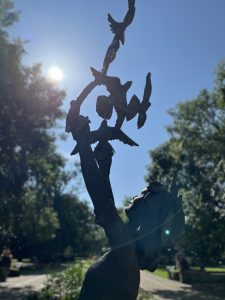 Stony indeed dives deeply into Alabama’s civil rights legacy. The residency isn’t just a primer for newer teachers of this history. It’s also a boost for the most experienced of educators.
Stony indeed dives deeply into Alabama’s civil rights legacy. The residency isn’t just a primer for newer teachers of this history. It’s also a boost for the most experienced of educators.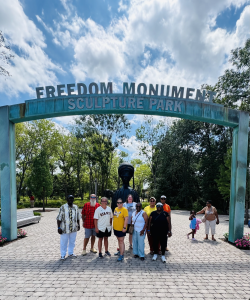 Back in April, the U.S. Department of Government Efficiency terminated AHA’s 50-year partnership with the National Endowment for the Humanities — and, with it, two-thirds of our annual budget. For more than half a century, AHA had used federal dollars appropriated by a bipartisan Congress to support statewide grantmaking and programming such as Stony and AHA’s beloved
Back in April, the U.S. Department of Government Efficiency terminated AHA’s 50-year partnership with the National Endowment for the Humanities — and, with it, two-thirds of our annual budget. For more than half a century, AHA had used federal dollars appropriated by a bipartisan Congress to support statewide grantmaking and programming such as Stony and AHA’s beloved 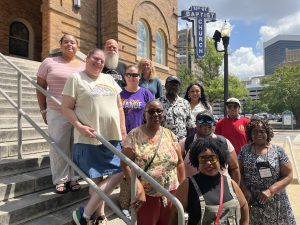
 “The Comer Museum had such a clear vision for hosting this exhibit,” says Laura Anderson, director of partnerships and outcomes for the Alabama Humanities Alliance. “They have gathered Sylacauga-area residents around the notion that innovation is at the heart of their community’s shared future — not imagining whether they will encourage innovation, but in how many ways.”
“The Comer Museum had such a clear vision for hosting this exhibit,” says Laura Anderson, director of partnerships and outcomes for the Alabama Humanities Alliance. “They have gathered Sylacauga-area residents around the notion that innovation is at the heart of their community’s shared future — not imagining whether they will encourage innovation, but in how many ways.” SYLACAUGA: THROUGH JULY 19, 2025
SYLACAUGA: THROUGH JULY 19, 2025 AHA also offered a
AHA also offered a  Today, the former Avondale Mills site is transforming into the home of the East Alabama Rural Innovation and Training Hub (EARTH). This transformative and innovative workforce development program, physically rooted in the town’s rich history, will help East Alabamians prepare for careers and industries that might not even exist yet.
Today, the former Avondale Mills site is transforming into the home of the East Alabama Rural Innovation and Training Hub (EARTH). This transformative and innovative workforce development program, physically rooted in the town’s rich history, will help East Alabamians prepare for careers and industries that might not even exist yet.

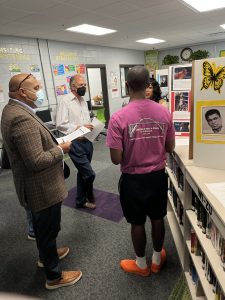 The 10-week Writing Our Histories pilot program culminated in an Alabama History Day contest on October 4, on the Mt. Meigs campus. Students presented their research as exhibits that colorfully highlighted what they’d learned on topics ranging from World War II and the Civil War to Alabama athletes and the civil rights movement. Students confidently and enthusiastically talked about what they’d learned, answering questions from Alabama History Day judges who work professionally as educators, historians, and authors. Teachers from other DYS campuses also attended to observe and bring the experience back to their own classrooms.
The 10-week Writing Our Histories pilot program culminated in an Alabama History Day contest on October 4, on the Mt. Meigs campus. Students presented their research as exhibits that colorfully highlighted what they’d learned on topics ranging from World War II and the Civil War to Alabama athletes and the civil rights movement. Students confidently and enthusiastically talked about what they’d learned, answering questions from Alabama History Day judges who work professionally as educators, historians, and authors. Teachers from other DYS campuses also attended to observe and bring the experience back to their own classrooms.